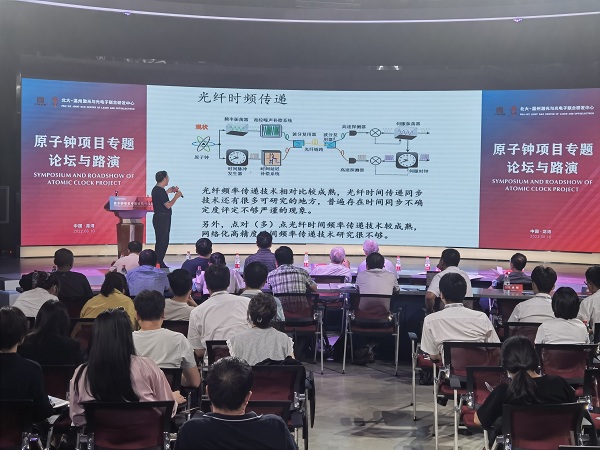Industrial heavyweights share insights into China's atomic clock development

The Symposium and Roadshow of Atomic Clock Project is held in Longwan district, Wenzhou, East China's Zhejiang province on Aug 10. [Photo provided to chinadaily.com.cn]
The Symposium and Roadshow of Atomic Clock Project, attended by many industrial heavyweights, was held in Longwan district, Wenzhou, East China's Zhejiang province on Aug 10.
An atomic clock measures time by monitoring the frequency of the radiation of atoms. It is based on atoms having different energy levels. Atomic clocks can be used in fields such as aviation, aerospace and telecommunications and have broad market prospects.
Wang Yiqiu, a Chinese physicist and former executive deputy president of Peking University, Liu Liang, a researcher at the Shanghai Institute of Optics and Fine Mechanics of the Chinese Academy of Sciences, and Fang Fang, director of the National Institute of Metrology, shared three academic reports on atomic clocks during the event.
Wang Yiqiu presided over the research and development the first atomic clock in China. He talked about his career in scientific research by telling 11 stories and explained the latest ideas and progress in the atomic clock field.
Nine roadshows were also carried out by professors and researchers from Peking University, the Wuhan Institute of Precision Measurement, the Chinese Academy of Sciences, Tsinghua University, and the National Institute of Metrology, making the event a platform to promote technical and industrial exchanges and cooperation based on the demands of Longwan's industrial development.
The Peking University-Wenzhou Laser and Optoelectronics Joint R&D Center, one of the sponsors of the event, was established in 2019 to promote the development of the laser and optoelectronics industry in Longwan district. It works to develop scientific research teams and promotes related R&D conditions, while also providing technical consultations and services for enterprises, schools and scientific research teams.
Longwan has been working to develop large incubator clusters this year. A total of seven bases, including the China Eye Valley and Beidou Industrial Base, have been preliminarily listed to pilot the work.








